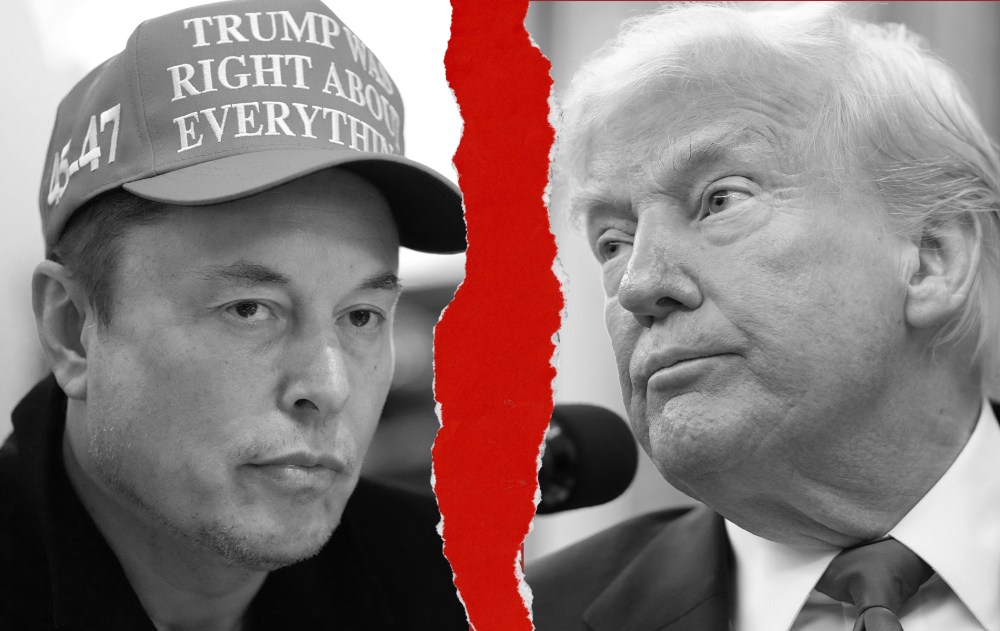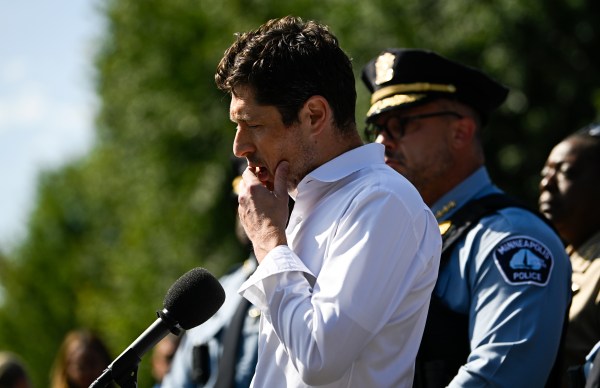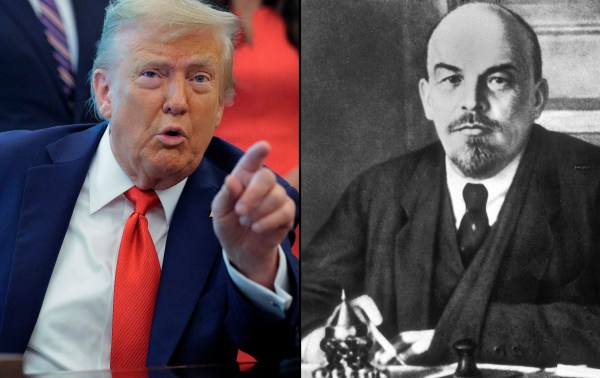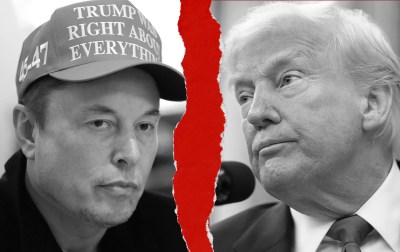Dear Reader (including those of you with pathetic laments),
After a long day marked by the most powerful politician in the world and the richest man in the world flinging poo at each other like the last two survivors of a spider monkey clan war, the vice president of the United States—himself a prolific tweeter—finally found his voice.
“President Trump has done more than any person in my lifetime to earn the trust of the movement he leads. I’m proud to stand beside him,” J.D. Vance posted on X.
This reminded me of something a colleague of mine once said over a decade ago: “With Ted Cruz, the Republican Party finally has the leadership it deserves.”
He was jokingly trying to come up with something one could say to partisan Republicans who loved Ted Cruz while also winking at those who don’t. As Leo Strauss observed, “What the author is silent about is often as important as what he says.”
Bringing Straussian hermeneutics to a J.D. Vance tweet is a bit like using a jeweler’s loupe to examine a mood ring you won at Chuck E. Cheese. Nonetheless, what Vance doesn’t say is at least as interesting as what he does say. He doesn’t mention Elon Musk, the (groan) Big Beautiful Bill, or any of the charges Musk or Trump have leveled at each other. He doesn’t define this movement that Trump leads. He certainly doesn’t spell out what, exactly, Trump has done to earn the trust of the movement that shall not be named. And he didn’t say that Trump has earned the trust of Americans or voters—because that would really be ridiculous.
There’s kind of a subtextual tautology to the phrasing. If the movement is a cult of personality —and a significant portion of MAGA is definitely that—then, at that level, it’s unfalsifiable. Sort of like, “Jim Jones has done more to earn the trust of people who irrationally worship Jim Jones than anybody else.”
Vance keeps it all ethereally abstract—save for the one thing he has to communicate concretely: He’s standing “beside” Trump. “Behind” would have been more accurate because that’s what he’s actually doing, using Trump as a kind of human shield. Vice presidents in general, and Trump’s surrogates in particular, are normally expected to go on offense against Trump’s enemies. But Vance isn’t doing that here. He isn’t attacking Musk, he’s holding an umbrella over Trump while the big man does the fighting.
I don’t think that’s cowardly per se—though one always wonders what Trump thinks about such failures to fetch-and-fling fistfuls of feces from the golden bowl of monkey poo on the Resolute Desk. It’s smart politics—for Vance. He doesn’t need to make Musk more of an enemy than absolutely necessary. Musk, and the faction(s) he represents, are crucial to Vance’s political future so some cynical circumspection is wise.
The Cracker-Dämmerung
Yesterday morning, I did a lot of opining on the brewing Musk-Trump feud (on the solo Remnant out tomorrow and on NPR’s Morning Edition), but this was before things climbed the escalatory ladder like a sailor trying to escape a sinking submarine. I didn’t think it would get so ugly so quickly, but I did say something that I think will turn out to be correct. I speculated that this moment will be remembered as the beginning of a narrative that will become more and more central to the second Trump term. Call it the “MAGA crack-up.”
I use that term deliberately. In his 1992 book, The Conservative Crack-Up, R. Emmett Tyrrell Jr., founder of The American Spectator, declared the unraveling of conservatism—an event he’d been prophesizing since the late 1980s—had arrived. As one might imagine, few loved this prophecy more than progressives because they wanted it to be true. The same impulse drove many fringe right-wingers, also craving the implosion of mainstream conservatism, to constantly mistake anecdotes for trends. Like the Jehovah’s Witnesses who kept moving the date for the End Times (1878, 1914, 1918, 1925, and 1975) they kept the party hats nearby and the beer chilled for the party that didn’t come.
Meanwhile conservatives, including me eventually, gently rejected the popular Tyrrell’s Chicken Little-ism, while heaping scorn on the wish-casting of the progressives who took it to heart.
Like many a Jeremiah, Tyrrell wasn’t wrong so much as premature. Indeed, American conservatism has always had an unhealthy dose of doomsaying to it. The original working title of Russell Kirk’s (1953!) The Conservative Mind was The Conservative Rout. Before settling on The Conservative Mind, Kirk also considered The Conservative Retreat. Whittaker Chambers famously said that he was probably switching to the “losing side” when he moved rightward.
Regardless, Tyrrell’s argument that the conservative coalition would calcify and break apart had merit on many counts. He argued that populist energy is great, but untethered to principles it can be corrupting (sound familiar?). He rightly noted that the biggest challenges the right faced came from success, not failure. Winning the Cold War, for example, was a good thing, but winning the cause meant losing the issue. The result was a loss of philosophical coherence. Conservatives lost the creativity and élan of insurgents as they became ensconced in institutions and organizations dedicated to fundraising. As a result, various factions lost interest in compromising for the sake of the larger cause, preferring to put their own interests at the top of their agenda. Each leg of Reagan’s three-legged stool wanted to amputate itself and sit atop the now-unbalanced tripod like a throne. Tyrell was wrong when he wrote it, but a quarter century later, I was arguing that Armageddon may finally be visible on the horizon with Donald Trump riding an escalator instead of a Pale Horse.
Tyrell’s premature eschatological ejaculation underestimated the coherence of conservatism and overestimated the fissiparity of the GOP coalition. Social conservatives may have wanted to be behind the wheel, but they still liked tax cuts. Foreign policy hawks may have lost their great cause, but conservatives still liked being a superpower (and 9/11 offered a short-lived opportunity to retrofit and revive arguments about civilizational conflict). And in an era when culture wars became more central to American politics, the left’s excesses perpetually propped up the right.
In short, there was still plenty of belief left in the tank to keep the right’s engine running. But what are the beliefs that sustain the Trump coalition? Hatred of the left is still there. The hunger for civilizational conflict still gnaws at the soul of some folks who want to make the fight on wokeness or the effort to depopulate America of illegal immigrants. Stephen Miller trots out this Cold War-style argument to cudgel debt hawks—many of whom should properly be called “debt swans,” in my opinion, given their penchant to honk loudly and pose elegantly for their positions. The other day Miller tweeted in response to the monstrous one-man incendiary pogrom in Boulder, Colorado, “We are in a struggle for the survival of civilization itself and we have libertarians threatening to derail the entire agenda over bogus CBO pie charts. We will be debating these matters over the ruins of the West if we don’t control migration.”
But, really, the thing that holds together “the movement Trump leads” is Trump. This is objectively obvious. It’s not that every elected Republican is a cultist, many are just terrified of being primaried by Trump cultists. Others are so loath to admit that Trump’s critics are right about his shortcomings that they overcompensate in the other direction, declaring every bad idea and error as brilliant. But the result is the same. And it is certainly the case that Trump believes—and operates from the belief—that the party is all about him. That’s why he assumes that any disagreement is driven not by conviction but by Trump hatred. Indeed, the way Trump insists that undermining him politically is treason speaks to how he views his role as president as a kind of monarchical absolutism.
The point I’m getting to is that a coalition built around a personality is destined to crack up far faster than a coalition built around ideas and interests. This is true of any coalition. When Alexander the Great died, his generals all set up their own kingdoms. William Jennings Bryan’s movement dissipated because he was the only thing that held it together.
The only “principle” holding the Trump coalition together is loyalty to Trump—not Trump’s ideas, because those change like the script of a Mexican soap opera. And the ideas he does hold dear are reviled by many factions in his coalition. Very few Republicans like this trade war stuff—they just lack the courage to say so publicly. So they either lie or fall back on “I trust Trump” or “This is what the people voted for.” Even the arguments for tariffs from Trump and his surrogates change daily. Some days—or at some hours—they’re a temporary tool to force free trade on the world. Other days they’re a permanent policy to raise revenue. And sometimes they’re a tool to wean America off trade entirely. These arguments are all contradictory. If we force everyone to zero tariffs, there’s no tariff revenue. If we keep them high, we will sell less to the world. And if we make everything here, why trade at all? The only unifying thing to these contradictory policies is that they all come out of Trump’s piehole.
The institutions of the Republican Party today are a bit like drones operated by a single person. Trump doesn’t want them to be autonomous—no AI for you! When the operator goes, the drones all crash, smash into each other, or fly away like a lost balloon.
The Musk-Trump crack-up, whether it keeps running or settles into a ceasefire, is not the first hint of the inevitable splintering, but it’s arguably the most significant one. That’s partly because Musk represents a real faction and has the resources—money, a social media platform, credibility with his own cult of personality, and sheer will—to make arguments broader segments of the coalition subscribe to. Those arguments have their own power because they’re about something other than mere loyalty.
That said, one can see the cracks and tensions all over. Trump has decided that the Federalist Society is “anti-Trump” because the Federalist Society and its fans believe there is something more important than Trump—the rule of law and the Constitution. Loyalty to, or fear of, Trump keeps many of those people too silent. But they’re not going away. The Trump administration is going to war against domestic antisemitism, which is a good thing in principle if not always in execution. But it’s also hiring antisemites at an alarming clip. Trump’s inner orbit has Israel supporters and Israel haters swirling around like a reenactment of The Three-Body Problem. The Trump coalition has mercantilist bozos and right-wing New Dealers pitted against free traders and Reaganites. Some want to reassemble the FDR coalition by adopting FDR’s policies, others want the unions to move into their ranks for culture-war reasons while keeping right-to-work policies. When Trump floated the idea of raising taxes on top earners, you could see people running to the intellectual and political armories to make ready for war. It didn’t happen, but the knives will stay sharp and the ammo well-stocked.
It is an actuarial and constitutional fact that Trump won’t be president—or around—that much longer. J.D. Vance knows this. And so does everyone else. The idea that Trumpism will survive Trump is a fantasy he and others are desperate to keep alive. But the crack-up is coming. What comes after it is unknowable, but that doesn’t make it any less inevitable.
Various & Sundry
Canine Update: I snuck out on the beasts yesterday (I’m in LA for a taping of HBO’s Real Time With Bill Maher). But given that I was alone with them for two weeks, they’re probably happy for some quality time with The Fair Jessica. There’s not too much to report. But we did have some drama when Pippa tried to maximize belly rubs and fell off the edge of the bed. Gracie was very happy with TFJ’s return, because with two humans in the house there’s always one lap that she can colonize without too much protest from Zoë. Indeed, Gracie declined treats to remain in her lap the other morning (why Pippa also declined treats is a mystery. But she seems fine). Speaking of cats, the supply of Paddington and Fafoon remains un-tariffed. I even procured a picture of Paddington’s father. Also, yes, I continued to appease Chester in TFJ’s absence.
The Dispawtch
Owners Name: Howard Lewis
Why I’m a Dispatch Member: I joined before the paywall went up because I wanted a news/opinion outlet that would help me keep my sanity and was not infected by Trump derangement syndrome (both pro and con).
Personal Details: I am a government attorney in the swing state of Pennsylvania. My vote in every federal election counts. I left the GOP in April 2016 when Trump effectively won the nomination and have been “homeless” ever since that time. Also, I love the Beatles almost as much as Charlie Cook.
Pet’s Name: Col. Theodore “Teddy” Roosevelt
Pet’s Breed: The best mutt ever, but probably German shorthaired pointer and something else.
Pet’s Age: 6
Gotcha Story: Shortly after we lost our first dog to cancer (Gen. Dwight David “Ike” Eisenhower) we saw his photo at a pet rescue site with a backstory of a roughly 5-month-old puppy found in a South Carolina truck stop all alone. We had to adopt him.
Pet’s Likes: Being with his people. Traveling like a champ long distances in the backseat of our truck without making a peep from Pennsylvania to Orlando, Florida. All the attention and daycare visits with his pals.
Pet’s Dislikes: Not being with his people. He is completely cowed by our 16-year-old grey tabby cat, Pip. Teddy will not walk past Pip on the stairwell without an escort.
Pet’s Proudest Moment: When we were sitting at Disney’s Fort Wilderness beach with Teddy before the firework show, a lady behind us chided us for bringing him to a loud firework display. The show started and Teddy took a nap. He’s a good boy and a gun dog.
Bad Pet: He’s the goodest boy so it never happened. However, he did eat an entire raw pork loin left on the countertop by his grandparents. Really, who is at fault there? How was he to know? (He moaned with a bellyache all night at the foot of our bed.)







Please note that we at The Dispatch hold ourselves, our work, and our commenters to a higher standard than other places on the internet. We welcome comments that foster genuine debate or discussion—including comments critical of us or our work—but responses that include ad hominem attacks on fellow Dispatch members or are intended to stoke fear and anger may be moderated.
With your membership, you only have the ability to comment on The Morning Dispatch articles. Consider upgrading to join the conversation everywhere.